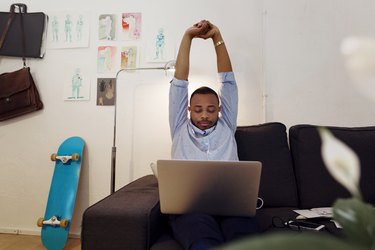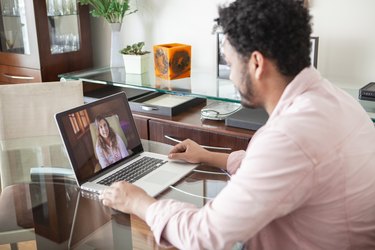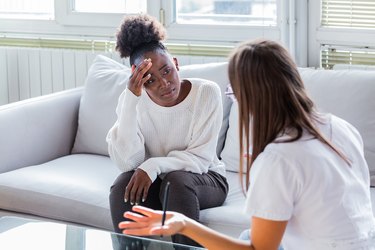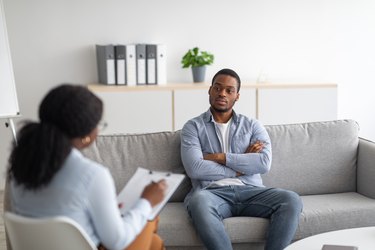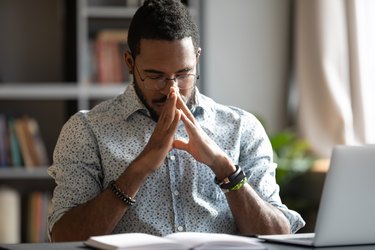
Experiencing anxiety from time to time is normal, especially in reaction to stressful events or situations. And with the current state of the world — violence, racial injustice, political unrest, climate change — the stressors may feel unending.
If you're feeling worried, restless and on edge all the time, it may be difficult to differentiate between symptoms of situational anxiety and a more chronic mental health issue known as generalized anxiety disorder or GAD.
Video of the Day
Video of the Day
What Is Generalized Anxiety Disorder?
Mental health statistics show GAD — characterized by excessive, exaggerated and pervasive worrying — affects 3 percent of the U.S. population, according to the National Institutes of Mental Health.
"People with generalized anxiety disorder tend to continuously expect cataclysmic and apocalyptic outcomes," says Rosalind S. Dorlen, PsyD, a New Jersey-based, board-certified clinical psychologist and member of the psychiatry department at the Overlook Medical Center. They also struggle to stop or control worrying, which is often out of proportion for the situation.
When severe, GAD can negatively affect a person's quality of life and interfere with their ability to function daily.
If you're stuck in a constant state of worry, fear and dread, you may want to seek the help of a professional (more on that later).
How to Cope With Anxiety
Whether you're living with GAD or you're experiencing an increase in anxiety due to stressful current circumstances, these five soothing strategies may help when your worries feel overwhelming.
1. Prioritize Physical Activity
When you're feeling on edge, the best medicine may be movement. "The relationship between physical activity and anxiety is both psychological and physiological," Dorlen says.
For one, "exercise feels good, clears our mind, reduces tension and promotes social interaction," she says. But working out also affects the chemistry of our brain.
"Exercise has been shown to affect neurotransmitters that regulate anxiety including serotonin, norepinephrine, dopamine and endorphins," Dorlen explains.
What's more, physical activity stimulates parts of your brain that help control the amygdala, your brain's fight-or-flight center, per Harvard Health Publishing.
"You can't change that highly stressful events happen, but you can change how you interpret and respond to them."
These physiological effects combined with the psychological benefits may help explain why regular exercise helps alleviate chronic anxiety and, for many, reduces the frequency and severity of panic attacks, Dorlen says.
Indeed, a June 2019 meta-analysis in Depression and Anxiety found people who engaged in a high level of physical activity experienced fewer symptoms of anxiety compared to their more sedentary peers.
And your exercise of choice doesn't have to be high-intensity. Low-impact movements like tai chi and yoga are helpful against anxiety, too. Case in point: A small November 2019 study in the Journal of Psychiatric Practice linked a regular yoga practice to reduced anxiety and depression.
If sweating's the last thing you feel like doing, give yourself permission to start small. Even just a five- or 10-minute walk is better than nothing.
2. Stick to Healthy Whole Foods
While a balanced, nutritious meal plan isn't a cure for anxiety, it can help you cope better.
That's because what you put in your body can affect your mood. "For example, complex carbohydrates are metabolized more slowly and therefore help maintain a more even blood sugar level, and, consequently, [more] calmness," Dorlen says, because low blood sugar may make you feel jittery or more anxious.
Aim to pack your plates with a balance of whole grains, lean proteins and healthy fats. Doing so not only keeps you feeling fuller for longer but also helps keep your blood sugar stable.
Conversely, ultra-processed and sugary foods can screw with your blood sugar levels and your mood, so try to avoid them as much as possible. You may also want to limit alcohol and caffeine since they can make you feel on edge and sabotage your sleep, per the Mayo Clinic.
3. Practice Meditation
Learning to slow down your mind and breathe deeply can help guide you through anxious moments.
"Mindfulness and guided meditation practices centered around breathing can stimulate parts of the brain and nervous system responsible for creating a sense of calm and tranquility," Dorlen says. "Breathing exercises and meditation empower us to deal with negative and anxious thoughts."
Not only can meditation help modulate your mood, some researchers hypothesize it may actually alter your brain.
A May 2013 study in PLOS One found people who reported the highest levels of mindfulness exhibited smaller brain volume in the amygdala, the structure that reacts to real or imagined threats. While the study does not prove meditation changes the brain, the researchers think this structural difference might explain why meditators don't react as frantically to stress.
If you're new to mindfulness techniques, try simply sitting in a comfortable position for a few minutes as you inhale and exhale deeply and focus your attention on your breathing. If more guidance might help, try a beginner-friendly meditation app like Headspace, Calm or Insight Timer.
4. Limit Catastrophizing
Like many anxious people, you might find your mind racing through "what-if" scenarios and jumping to catastrophic conclusions, Dorlen says, adding that we all have a "tendency to exaggerate the negative and diminish the positive."
But this negative thought pattern is likely baseless, she says. "We often draw wrong conclusions based on incorrect, incomplete and inconclusive evidence."
To help you recognize your catastrophizing and ground yourself in reality, Dorlen suggests asking yourself the following questions:
- How likely is it that this feared scenario will actually happen?
- Is there a more realistic way to think about what could happen?
- Can you visualize a more positive outcome?
By checking your own irrational assumptions and fears, you can gain a healthier perspective. "You can't change that highly stressful events happen, but you can change how you interpret and respond to them," Dorlen says.
To that point, reminding yourself that you're a capable person can be a helpful strategy for coping with anxiety. For example, thinking about a time when you faced and successfully handled a problem can give you a sense of control and competence.
"It helps to nurture a positive view of yourself and trust your ability to solve problems and thrive," Dorlen says.
5. Seek Help
When anxiety overpowers your decisions, dominates your thinking and makes it hard to navigate your day-to-day (whether that be work, school, social activities or relationships), it's time to consider consulting with a licensed mental health professional, Dorlen says — and there's zero shame in doing so.
A trained therapist can help you expand your toolbox of techniques to reduce anxiety and panic reactions, as well as assess whether you might benefit from medication, she says.
When it comes to coping with GAD, the most effective, evidence-based treatment is cognitive-behavioral therapy (CBT), a technique that helps you identify, understand and change your thinking and behaviors, according to the Anxiety and Depression Association of America (ADAA).
You can find a therapist who specializes in anxiety through the ADAA's online directory of mental health providers.
- ADAA: Generalized Anxiety Disorder
- PLOS One: “Dispositional Mindfulness Co-Varies with Smaller Amygdala and Caudate Volumes in Community Adults.”
- Mayo Clinic: “Coping with anxiety: Can diet make a difference?”
- Depression and Anxiety: “Physical activity protects from incident anxiety: A meta‐analysis of prospective cohort studies.”
- Harvard Health Publishing: “Can exercise help treat anxiety?”
- Journal of Psychiatric Practice: “Psychological Function, Iyengar Yoga, and Coherent Breathing: A Randomized Controlled Dosing Study.”
- NIMH: "Generalized Anxiety Disorder"
Is this an emergency? If you are experiencing serious medical symptoms, please see the National Library of Medicine’s list of signs you need emergency medical attention or call 911.
